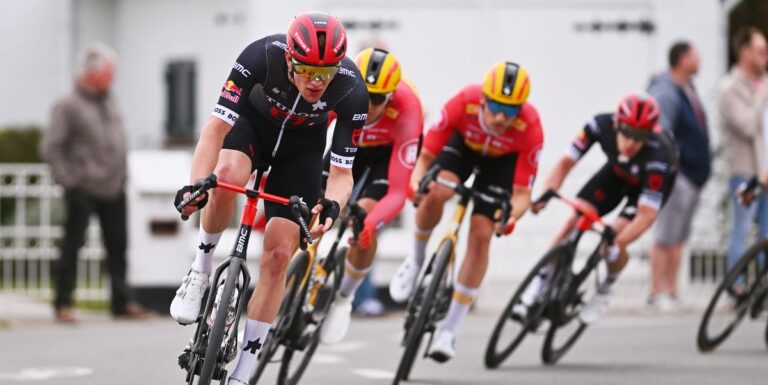PRO CYCLISTS are riding faster than ever. And while there’s plenty of gear, science and tech tools to help, that isn’t everything that you need to be successful. Fabian Cancellara has won more than a few races in his day (including Paris-Roubaix, the Tour of Flanders, an Olympic gold medal and he wore the yellow jersey for 29 days in his Tour de France career, to name a few). Today, as owner of the Tudor Pro Cycling team, he’s clear that developing great cyclists means paying attention to the humans on the bikes. Not just the numbers, the data, and the wins. Those are important, too, but they’re nothing if you don’t invest energy in the people behind them.
We caught up with him on a (very) casual group ride in Newport Beach, CA, just as he was building out his roster for 2025 with Julian Alaphilippe and Marc Hirschi. “They bring a tremendous amount to the team on the athlete side and on the personal…I’ll call it the human side,” Cancellara says.
Cancellara himself was known for his range and daring as a rider. As a team owner, he’s committed to the same ethos for his athletes—helping them grow as riders and as people. As an owner, he says, there are two ways of approaching things—one, “it can be harsh and this is driven by numbers; it’s a more hard-line approach,” he says. “The empathetic person goes with the people and helps them grow. There’s no bad, and there’s no right or wrong—it’s just different,” he says. But he’ll take the latter any day. In this age of tech domination, here’s how the team keeps things human:
Enable the rider to be happy
“HAPPY PEOPLE perform better, happy people live better. And without people, nothing will work,” Cancellara says. The philosophy dovetails with the popular idea that it’s not always the fastest team that wins, it’s the one that stands up for each other. “In the end, it’s the team, not the individual, that wins,” he says.
Today, riders are so focused so early in their careers, and the sport is requiring more and more from them. “Long term, I think it’s not good, because they live less long in the sport,” he says. So he encourages them to focus on growing so they’re not in a situation where they “unplug and have nothing,” he says, adding “pizza and beer and sausages can also be something good sometimes.”
Play the long game
WINNING RACES isn’t the only win. As a newer team, he says, “we will lose more bike races than we will win, so we will get smashed more than we celebrate. But I think we are on the right path with what we have created.” A team that works together, and one that has a “daring approach” as he calls it (for instance, “we’re not just going to ride at the back and think we’re going to win on the sprint”), and a strategic plan are wins that help you put things in place for the future. (Already the team has racked up successes in some of the spring classics.) Tudor Pro Cycling just became a UCI pro team in 2023, so it’s free of “this is the way we’ve always done things” vibes, aiming to build a culture of two-way listening.
Let people make mistakes
CANCELLARA BELIEVES mental performance training is valuable—but so are mistakes. And that it’s helpful for athletes to make them and find their way out. “It’s like with kids—they need to teach themselves to walk,” he says. What’s essential, however, is to have the right people around the athlete so they’re supported when mistakes happen. “I’m in the front to protect when things aren’t going well. I think this is more important than being there when they win. When we win, there are enough people around. I like to be there when it doesn’t go well,” Cancellara says.
After more than 17 years of racing, Cancellara gets that “you can’t be perfect all the time.” So key in the team’s debriefings is that “it’s not personal. In the end, it’s the human who rides the bike, not a robot. But we do help motivate them to restart, rethink, retrain and try to do it better next time,” he says. “And help them let go of things.”
Rely on the whole peloton
EVEN THE C-suite should be about being human, according to Cancellara. He finds that in some ways, owning a team isn’t that different than being a pro cyclist. You’ve got to have the right people in the right place in the corporate peloton, so to speak. Get people in place who are great at each of their domains so you can do your job and they can do theirs. “The CEO is only good when the people around are helping to shape them,” he says.
Marty Munson, currently the health director of Men’s Health, has been a health editor at properties including Marie Claire, Prevention, Shape and RealAge. She’s also certified as a swim and triathlon coach.
Read the full article here


